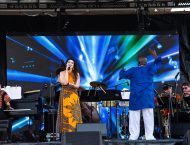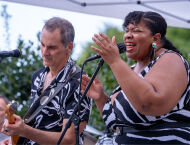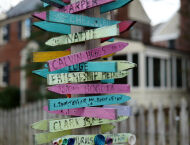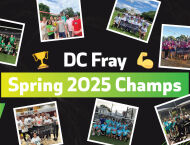Culture
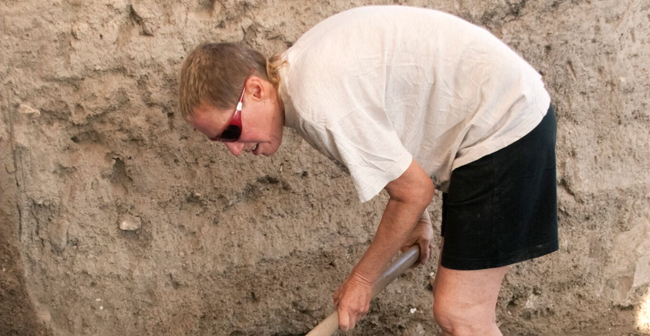 Photo: Courtesy of National Geographic
Photo: Courtesy of National Geographic
Explorer Jodi Magness Discusses Discoveries of Ancient Israel
November 27, 2018 @ 12:00am
From age 12, Jodi Magness knew she wanted to be an archaeologist, and never looked back.
Thursday she’ll discuss one of her many discoveries, a mosaic depicting the first non-Biblical story ever found decorating an ancient synagogue. She’s set to speak about her findings and why they matter at the National Geographic Museum in two sessions of a talk titled, “Uncovering Galilee: New Discoveries in the Holy Land.”
Magness and other archaeologists debate what story the mosaic, which features two men surrounded by soldiers and battle elephants, tells. One theory suggests the image shows the encounter between Alexander the Great and the Jewish high priest. (Explore pictures of the mosaic at this link.)
Since 2011, and thanks to a National Geographic grant, Magness and her team have been excavating the synagogue in the fifth-century village of Huqoq, three miles west of the Sea of Galilee in Israel. The synagogue is the only public building in the settlement, whose residents largely practiced agriculture.
Ancient Huqoq was not a rich urban center, but had a stunningly beautiful synagogue – what gives?
Written documents indicate that synagogues like the one at Huqoq did not exist. Roman legislation at the time – Christianity had already become the empire’s religion – banned construction of new synagogues. Some Christian writers wrote polemics attacking Judaism. As a result, a narrative developed in which Jews in this time and region lived a marginalized, oppressed existence. Magness’ research pushes back against that monolithic conception.
In doing so, Magness explains, her work demonstrates the importance of her field.
“Archaeology supplements the rather skewed and narrow picture that we have just from literary sources,” she says. “Literary sources from the ancient world were always written by elite people and represent a certain point of view.”
“Archaeology is a great corrective” to elite-produced literary sources, Magness continues. “Archaeology is a democratic enterprise [because we] dig up everything, including the houses of ordinary people, which gives a much more complete picture of ancient life.”
Surviving Jewish written documents from this time were produced exclusively by male rabbis, but Magness’ research attests to the presence of women at the site as well. For example, mosaics of two women flank a dedicatory inscription at the synagogue. Magness says that the identities of the women are unknown, but it’s possible they were donors.
Other evidence of female presence is more difficult to point out directly, but is indirectly indicated. For example, ancient houses excavated around the synagogue have included remains of spindle-whorls, and weaving during this time period was primarily a female activity.
Magness says her project has uncovered about two-thirds of the synagogue. There was a significant expansion and re-use of the synagogue during medieval times, but archaeologists still don’t know what that is. This work will take another four to five seasons. More information about the project, including applications for students interesting in joining the dig, is on the Huqoq website.
Magness is not the only female Explorer the National Geographic Museum is highlighting this season. The museum will host an event titled Expand the Field in February on the International Day of Women and Girls in Science, which will feature women improving our understanding of the world. Then in March, the museum hosts When Women Ruled the World, tied to the opening of the museum’s next exhibition, Queens of Egypt, celebrating legendary queens from ancient Egypt.
In the words of National Geographic’s Lexie de los Santos, “I’m quite proud of this season and I hope it influences women everywhere to realize the impact they can have on our world.”
Magness speaks at 7:30 p.m. on Thursday, November 29. Tickets are $25, and available here.
National Geographic Museum: 1145 17th St. NW, DC; 202-857-7700; www.nationalgeographic.org/dc


